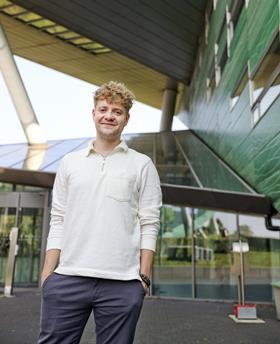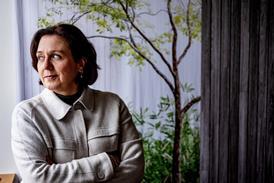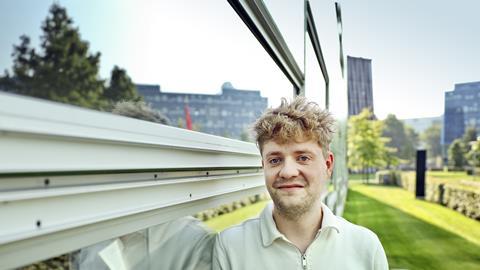When you’re driven by something bigger than yourself, it’s hard to put your work down, says Thomas Freese (32).
Thomas Freese is passionate about green and sustainable chemistry, which drives him in his PhD research. But when was this interest sparked? ‘I was studying at the University of Göttingen, in Germany’, Freese recounts. ‘It was and still is a university focusing on its strong background in theoretical and physical chemistry, producing scientists like Max Planck, Werner Heisenberg, Robert Oppenheimer and Niels Bohr. While I gained much knowledge about physical chemistry, sustainability wasn’t emphasised that much. But in 2018, I took a course on environmental chemistry taught by Professor Sven Schneider. At one point, he looked at the class and said: “You are the generation of scientists who need to solve the environmental problems and climate change.” That really stuck with me.’
It stimulated him to change his focus. After his bachelor’s thesis, Freese looked for a way to fill his master’s degree with sustainable chemistry and found it in Groningen. ‘I saw that there were numerous courses on sustainability, Green Chemistry, environmental policies and so on. So, I tried to convince my German university to accept these Dutch courses as part of my master’s degree, and fortunately it worked out. At the time, it was a very unusual choice, but since then sustainability has become an element in all facets of science.’
Pillars
After completing a research internship in the group of Katalin Barta, Freese continued his career first as a master’s student and then as a PhD candidate with Ben Feringa. Since Feringa was involved with ARC CBBC, there were quite some sustainability projects for him to take on. ‘The Feringa group is best known for its molecular motors, but now sustainability has become one of its four pillars.’
Freese’s most fervent wish is to see the Green Chemistry they do in the lab find its way into industry. Freese: ‘My goal is simply to get everyone on board with sustainability and to create a circular economy. We must get there.’ Freese believes that all chemical companies need to start working exclusively with Green Chemistry. ‘Modern life only works because chemistry provides everything, from colours and cars to clothes. I hope that everything I do supports that goal.’ Fortunately, he doesn’t see his work as just a job. ‘My job, my hobby and my drive are one and the same. That’s why I work long weekends. If I can help in any way, then it doesn’t matter when or how I do it.’
For his efforts, Freese was awarded the ACS Joseph Breen Memorial Fellowship for sustainability. ‘I received the award at the ACS Green Chemistry & Engineering conference in Los Angeles, which was one of the best experiences I’ve ever had. Even the inventors of Green Chemistry were there, and it was great to meet so many people who already knew me or had read my papers. The Green Chemistry community is very warm, but also thought-provoking and forward-thinking, and I’m proud to be a part of it.’

What did you study and where?
‘I studied chemistry at the University of Göttingen and at the University of Groningen.’
What motivates you in your work?
‘My motivation is rooted in the urgency and the speed necessary to combat biodiversity loss, the consequences of the climate crisis, and other environmental problems. Recognizing chemistry’s crucial role in the transition to a sustainable future, I’m committed to contributing to this work through Green Chemistry.’
What are your short-term goals?
‘First, to scale up our academic research for industrial application, bringing sustainable chemistry from the lab to the market; second, to enhance laboratory practices at institutions in Groningen and beyond, reducing costs and carbon emissions associated with research.’
What are your long-term goals?
‘To ensure that our research and its industrial scaling actively support the transition to a circular economy. I aim for my contributions in Green and Sustainable Chemistry to mitigate the climate crisis and help secure the survival of both society and nature.’
















Nog geen opmerkingen